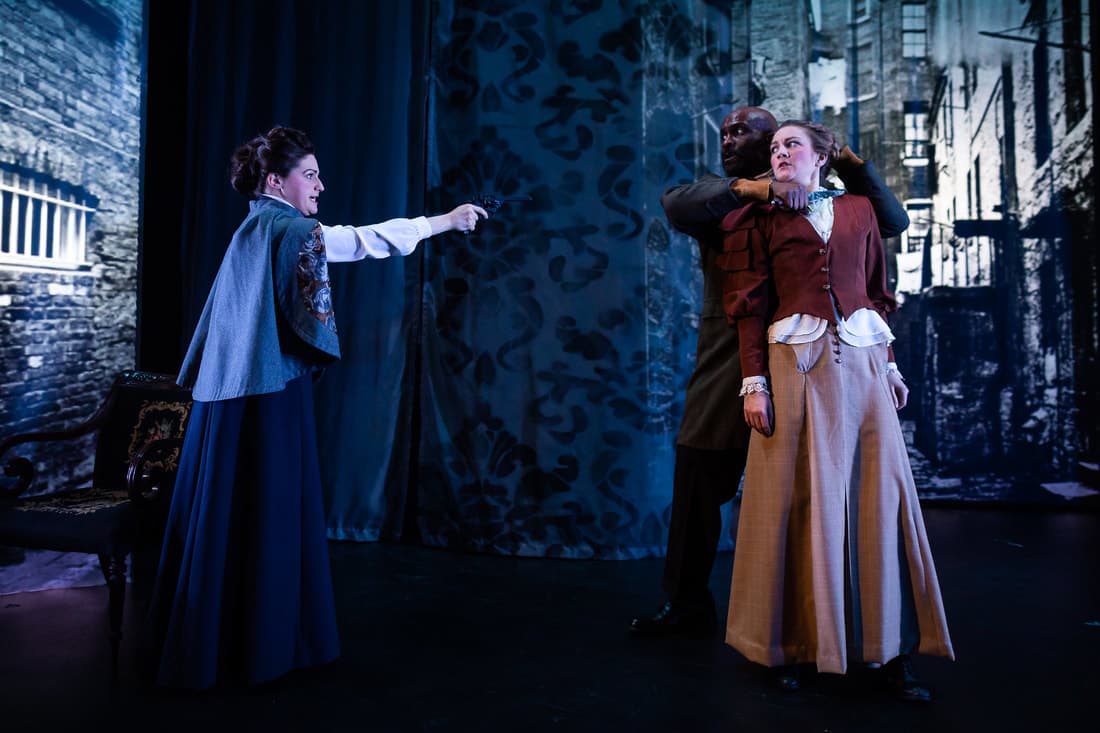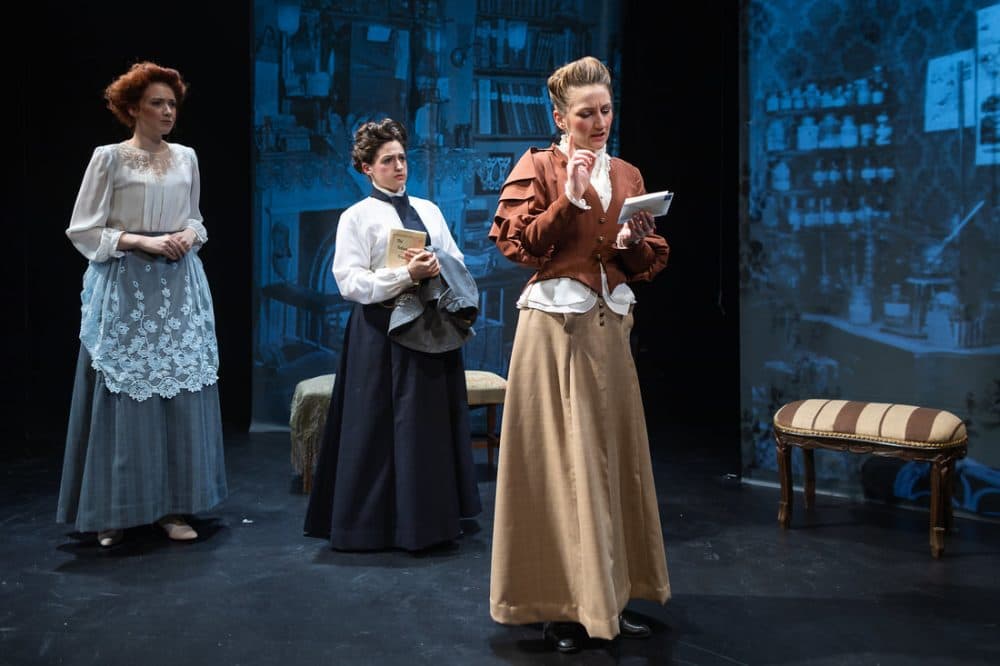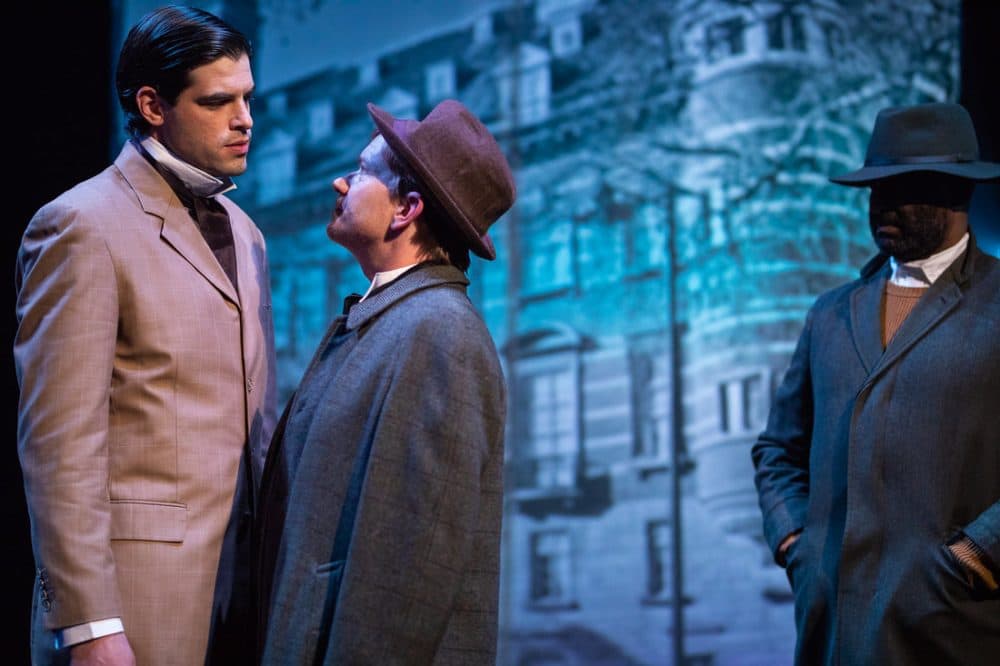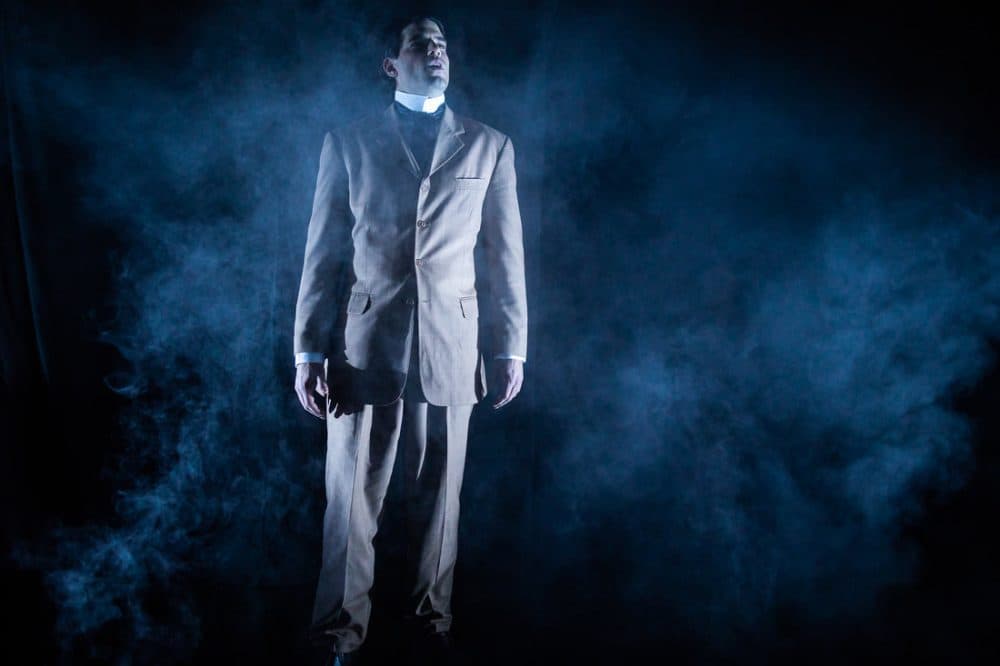Advertisement
Review
A Fascinating 'Miss Holmes' Makes Clear Traditional Gender Roles Wasted Women's Potential

“You’re very good at being underestimated,” one character tells another in Greater Boston Stage Company’s spare, but compelling, production of Christopher M. Walsh’s mysterious and multilayered crime drama from 2016. The fact that both characters are women living in Victorian England is very much to the point, because the play is “Miss Holmes,” a re-imagination of the legendary sleuth as a brilliant, tetchy member of the female sex.
Miss Holmes (Marge Dunn) — Sherlock, to her family and (as yet nonexistent) circle of friends — has a history of being confined to mental institutions, originally because of her love of learning (her mother thought this aberrant in a girl) but later on because she responds with violence to certain male modes of behavior. As one man puts it, “She does not react well to physical contact without permission.” That’s an understatement: Miss Holmes leaves men battered and bloodied if they dare to take liberties with her person.
If Miss Holmes were Mr. Holmes, of course, he’d be expected to do nothing less in the same situation and that gender disparity is, in many ways, what the play is all about.
Walsh underscores this subtext twice over by making Dr. Watson (Brittany Rolfs) a woman, too; Dr. Dorothy Watson is one of England’s first female physicians, and when we first meet her, dressed in a blood-spattered smock, she delivers an earful to an oblivious male colleague about the perfect storm of marital male domination and a systematic neglect of women’s health that’s had deadly consequences for one of her patients.

Not that Walsh gets so busy with morals and messaging that he forgets to have fun — far from it. “Miss Holmes” is littered with jokes, moments of levity, and characters we can laugh at fondly, such as Holmes’ fussy landlady, Mrs. Hudson (Cheryl McMahon), and Watson’s slightly dull, and eminently bemused, suitor (Patrick Varner). But this is not the comic farce you might expect from a play that ponders the possibilities of role reversing one of literature’s most celebrated characters.
Walsh takes Miss Holmes seriously, unlike many of the men of the Victorian era, and the mystery he’s contrived for her to solve is as dangerous and opaque as anything the traditional male Holmes had to face. To wit: Someone is sending warning notes to Lizzie Chapman (Monica Giordano), the wife of corrupt Scotland Yard inspector Thomas Chapman (Daniel Berger-Jones). Is someone looking for revenge on Chapman? Or do the notes signify concern for Lizzie’s well-being, when considering that the inspector already outlived two previous wives?
Advertisement

It’s a mystery the hulking Chapman means to solve for himself, and he’s not afraid to use lethal force. Accompanied by his menacing sidekick Mr. Greener (Damon Singletary), Chapman looms with palpable threat over a fellow Scotland Yard inspector Gregory Lestrade (Shelley Bolman) and, later on, insinuates the harm that might befall his former mother-in-law, Endora Featherstone (McMahon), if she doesn’t stop claiming he killed her daughter.
Physically imposing as he is, Chapman’s most effective weapon is political: With Holmes probing the case and potentially poised to dig up the real dirt on him, Chapman gains the ear of her disapproving, patriarchally controlling brother, Mycroft (Alexander Platt), the one person who has both the knowledge and the legal authority to throw Holmes back into the asylum and keep her there for good.
After seeing recent television incarnations of Sherlock Holmes as a leather-loving kinkster and a chilly, on-the-spectrum savant, it’s no outlandish stretch that we should be asked to think of Holmes as a woman. Dunn brings a clinical, even antiseptic, affect to the character. It’s an interpretation that almost always works, though the performance and the script do conjure different (and slightly incongruous) associations with Homes’ many exclamations of “Fascinating!”
That said, the show is fascinating with its sly, contemporary look at gender politics in the 1880s and how needlessly wasteful they were of women’s talents and the contributions they might have made but were denied. At the same time, director Weylin Symes hearkens back to the 1940s filmic representations of Holmes — the Basil Rathbone era — with the combination of Katheryn Monthei’s scrupulously spare scenic design and fluidly deployed projections, all in black and white, of locales and settings (the façade of a hospital, for instance, or the grimy precinct of a London back alley, or Holmes’ comfortably overstuffed study at 221B Baker St.). A pervasive haze effect completes the atmosphere, standing in for London’s famous fogs — as well, one suspects, as the clouded view men back then (and still too often now) take of women.

At more than two hours the play feels a little too long. It does not, however, feel like a play that’s set out to preach to us, yet Walsh’s insights about gender dynamics and institutionalized misogyny bubble up in hindsight for days after seeing the show. More interesting still is the way the play resolves the mystery at hand while remaining intriguingly open-ended. If Walsh writes a sequel, we can, perhaps, hope for a more satisfying female Moriarty than the one Jonny Lee Miller faced off with in the TV series “Elementary.”
“Miss Holmes” continues through April 22 at Greater Boston Stage Company.